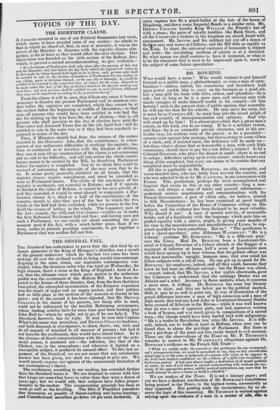TOPICS OF THE DAY.
THE EIGHTIETH CLAUSE.
A PASSAGE occurred in one of our Political Summaries last week, which seems to have puzzled some of our readers : we allude to that in which we observed, that, in case of necessity, it was in the power of the Minister to dispense with the registry clauses alto- gether, as far at least as they would affect the next election. Our observation was founded on the 80th section of the Reform Act; -which, to prevent a second misunderstanding, we give verbatim- " If a dissolution of Parliament shall take place after the passing of this Act and the Boundary Act, but before the day from which the registers of voters to be first made by virtue hereof shall begin to be in force, such persons only shall be entitled to vote in the election of membersof Parliament for any county or any riding, parts or divisions thereof, or for any city or borough, as would be entitled to be inserted in the respective lists of voters for the same, directed to - be made under this Act, if the day of election had been the day jiw mahing out such lists ; and such persons shall be entitled to vote in such election, although they may not be registered according to the provisions hereof." From this clause it will be seen, that if from any cause it became necessary to dissolve the present Parliament and to summon ano- ther before the registers are completed, which they cannot be at the earliest before the beginning or middle of December,—in that case, all persons who would have been entitled to vote had the day for making up the lists been the day of election,—that is, all persons who shall previous to the day of election have paid the Poor-rates and Assessed Taxes due on the 5th April last—will be entitled to vote in the same way as if they had been regularly re- gistered in terms of the Act. Thus, if Ministers should find from the returns of the names inserted in the Overseers' lists, that the constituency, in conse- quence of any unforeseen difficulties in working the registry, has been so contracted as to interfere with the freedom of election, they can at once (if our construction of the clause is not erroneous) put an end to the difficulty, and call into action the whole consti- tuency meant to be created by the Bill, by dissolving Parliament before the registry is completed. Nor do we think they could be accused of outrunning the necessity of the case were they to do so. It seems pretty generally admitted on all hands, that the registry clauses require amendment, and must be amended as soon as Parliament meets. The whole of the machinery of the registry is accidental, not essential to Reform; and if it operate to diminish the value of Reform, it cannot be too soon got rid of; and this conceded, it would be most absurd to congregate a Par- liament chosen by a third or a half of the constituency of the country, merely to alter that part of the law by which the two thirds or the half had been excluded, while we possess in the law itself the means of letting in the whole. The temporary part of the Act—namely, the Seth and 81st clauses—enables us to make the first Reformed Parliament full and free ; and having once got such a Parliament, we can surely set about . amending the per- manent part of the Act, with a much better grace than if we were, under its present puzzling enactments, to get together a Parliament that was neither full nor free.


























 Previous page
Previous page